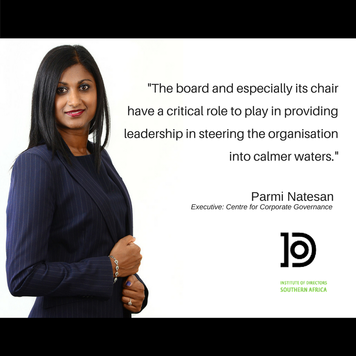|
The Mail & Guardian reports that SAA chair, Dudu Myeni, has recently missed several special board meetings, and that her colleagues on the board are taking legal advice in this regard. If these reports are true, they may indicate that Ms Myeni is failing to fulfil some of her duties as a director, and more specifically a chair.
The reports also demonstrate the intimate connection between good governance and organisational performance and sustainability, adds Parmi Natesan, Executive, Centre for Corporate Governance, Institute of Directors in Southern Africa. “It is common knowledge that SAA is in dire financial straits, and has been for some time. At such a time, more than ever, the board and especially its chair have a critical role to play in providing leadership in steering the organisation into calmer waters,” Ms Natesan says. “Not attending several special board meetings at a time such as this is worrying, especially given that board meetings are typically scheduled around the chair’s availability in the first place.” The law requires directors to exercise care, skill and diligence in their role. It is generally agreed that in this context, board members should not only attend meetings, but also prepare rigorously for them in advance, so that they can make a valuable contribution. If they cannot attend, they should furnish valid reasons to the rest of the board, and also consider providing input before the meeting on the matters to be discussed. Because board chairs play such an important role, various governance guidance documents elaborate on this responsibility. Providing overall board leadership and presiding over board meetings to ensure that time in meetings is used productively are just two of the many vital functions that would be difficult to exercise when a chair is repeatedly absent. “It would also be interesting to know whether the SAA board has a deputy chair in place, or a lead independent director, to ensure that meetings can proceed effectively in the chair’s absence,” says Ms Natesan. “The troubles at SAA and other parastatals provide yet more support for what the IoDSA has always emphasised: the principles of good governance are integral to improved performance and sustainability. We hope the board will show the courageous leadership that is needed to pull the organisation back on track.” ENDS MEDIA CONTACT: Juanita Vorster, 079 523 8374, [email protected], www.atthatpoint.co.za For more information on the IoDSA please visit: Website: www.iodsa.co.za Twitter: @The_IoDSA LinkedIn: Institute of Directors in Southern African Company Page
0 Comments
 Social inequality is a strategic risk for businesses globally, and particularly in South Africa. Consequently, directors need to ensure that initiatives to reduce inequality are core to the organisation’s strategic thinking and planning, says Karin Ireton, Chair of the Sustainable Development Forum (SDF), a forum of the Institute of Directors in Southern Africa (IoDSA). The SDF today launched a paper offering practical guidance to help directors and executives build effective, strategic responses to the challenge of social inequality. “As we have seen over years of protests about service delivery, unequal access to the most basic services affects many South Africans. In turn, that inequality translates into greater challenges in obtaining education and employment, negatively impacting the environment in which business operates, from the national mood to employee productivity, market resilience and the health of the supply chain,” says Ireton. “When inequality is particularly marked, as it is in South Africa, it threatens the long-term profitability and sustainability of all businesses. “While the primary responsibility for social redress rests with the state, business can and must play a role in promoting growth and prosperity. In line with the integrated thinking proposed in King IV, it makes good business sense to prioritise social inequality on the agendas of governing bodies and their strategic decision-making,” she adds. In short, directors need to steer organisations beyond seeing corporate social investment or philanthropy as a sufficient response to this challenge. Rather, overcoming social inequality should be an essential part of an organisation’s strategic review and goal setting. The paper shows how various aspects of social inequality impact specific business risks. For example, unequal education affects the available workforce and productivity; unequal healthcare affects productivity; and unequal opportunity creates resentment and, ultimately, an unstable market environment. “These are real business risks, and their scale and urgency in South Africa means a more business-like approach is needed, with the focus shifting from the amount spent (the typical corporate social investment metric) to effective monitoring and the measurement of impact,” says Ireton. “We have already seen this shift in the skills area: as access to the right skills has become a real risk, so companies have moved from a conventional bursary programme as part of corporate social investment into a formal investment in skills development pipelines.” The “talent risk” is particularly acute in highly unequal societies. Unequal countries like South Africa invariably have low-growth, unstable economies, and thus tend to become net exporters of those with scarce skills, who emigrate to seek greener pastures. The paper offers a set of 13 practical guidelines for directors to consider as they seek to make a measurable impact on social inequality in the quest for sustainability. Such guidelines include a continuous assessment of the socio-political context in which the organisation operates, particularly in relation to the shifting landscapes of key stakeholders; identifying opportunities that return benefits that extend beyond shareholder profits and employee remuneration; and looking at these issues with an operational focus. At a broader level, organisations need to find ways to promote inclusive capitalism and long term shared value, in which the widest possible grouping (stakeholders, consumers and communities) benefit from initiatives that also secure new markets for the organisation. “As the King Reports have consistently argued, organisations do not exist in a vacuum, and thus helping to ensure a healthy, stable society is a legitimate business goal. Inequality, as the driver of social instability and reduced economic opportunity, has become one of the most pressing business risks in the country,” concludes Tanya Nassif, Governance and Legal Specialist at the IoDSA. “Directors thus have the obligation to integrate initiatives for reducing inequality into their fundamental strategies in order to mitigate this risk. This paper begins to show how this can be done.” ENDS MEDIA CONTACT: Carla Coetzee, 072 112 8347, [email protected], www.atthatpoint.co.za For more information on the IoDSA please visit: Website: www.iodsa.co.za Twitter: @The_IoDSA LinkedIn: Institute of Directors in Southern African Company Page |
Archives
July 2024
Categories
All
|


 RSS Feed
RSS Feed